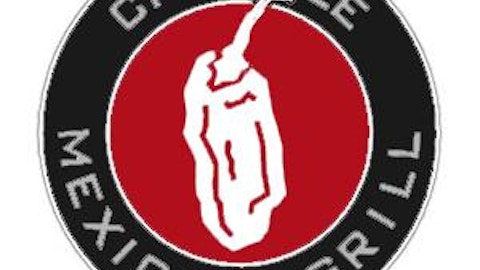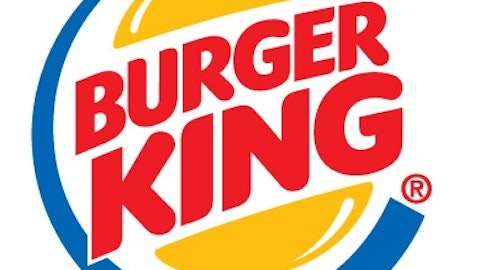
The stock in question is Yum! Brands, Inc. (NYSE:YUM) and investors may be wondering if now is the time to cut and run. However, in times like this it’s useful to take the time to fully evaluate the situation to better understand if the company’s problems are ones that can be fixed with time.
Trouble in China
When Yum! Brands, the operator of fast-food chains KFC, Taco Bell, and Pizza Hut, makes a statement about its Chinese operations, investors pay close attention. And rightly so: the company derives more than half its sales from China alone. However, the news was far from good when in December the company revealed its KFC sales in China would suffer after the government announced it was investigating a chemical residue found in a small portion of its chicken supply.
When it comes to China, Yum certainly isn’t the only game in town. Close competitor McDonald’s Corporation (NYSE:MCD) has put huge efforts into developing its operations in China. McDonald’s is executing on its plan to open 225 to 250 new restaurants every year until it reaches its stated goal of 2,000 restaurants in China by the end of 2013. Furthermore, McDonald’s offers a higher dividend yield and trades at a lower trailing price-to-earnings ratio than Yum.
Yum reported its fourth-quarter and full-year results in February, and investors were understandably concerned when Yum reported a 6% drop in fourth-quarter 2012 sales at established restaurants in China and forecast a 25% drop for the first quarter. Investors might be ready to shun companies with operations in China because of volatile results like these.
That’s certainly understandable, and to that point, an investor may want to consider The Wendy’s Company (NASDAQ:WEN). Wendy’s does not have international operations. The company operates almost exclusively in the United States, with a few locations in Canada, and its stock has been on a tear lately. Wendy’s is currently sitting at highs not seen since the 2008 Great Recession, and offers a 3% dividend yield, better than Yum’s yield.
Focus on the broader picture
With regard to Yum, it’s worth taking the long-term view in situations like these. There’s little doubt that Yum is struggling in China. However, I feel this is a short-term issue. It’s important to see Yum’s problems in China in the right context. Yum’s overall 2012 results presented a more complete and optimistic perspective. Yum reported full-year earnings growth of 13% to $3.25 per share, excluding special items. Moreover, the company’s growth plans remain solidly intact, as the company opened a record 1,976 new international restaurants.
Chief Executive David Novak said on a conference call with analysts that the company will need time to restore its reputation with Chinese consumers. When a company endures a hit to its brand image, there’s usually not much that can be done other than needing time to remedy the situation. Yum is refining and strengthening its food safety standards and plans to begin an aggressive marketing campaign after the Chinese New Year to restore KFC’s brand image.
Overcoming damage to a company’s brand image is never easy, particularly when the company in question sells food. Consumers can be quick to turn away from a company whose food quality is in question, but that perception should fade with time.
Yum has a great reputation for both food quality and popularity, and I agree with the CEO—Yum’s problems in China will be overcome, if investors are willing to exercise some patience. I believe that all of these stocks—McDonald’s, Wendy’s, and also Yum—are high-quality stocks worthy of consideration by all investors interested in the fast-food industry.
The article Will Time Heal What Ails This Fast Food Stock? originally appeared on Fool.com and is written by Robert Ciura.
Copyright © 1995 – 2013 The Motley Fool, LLC. All rights reserved. The Motley Fool has a disclosure policy.





